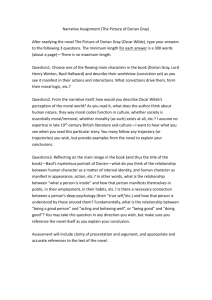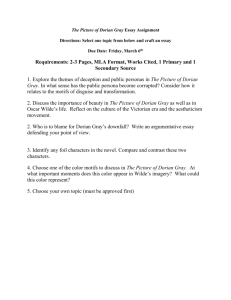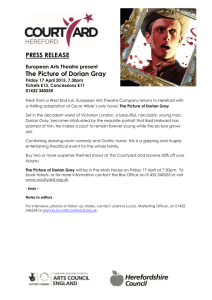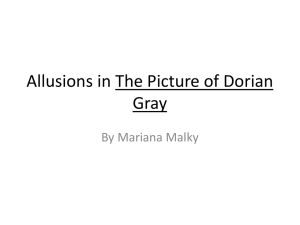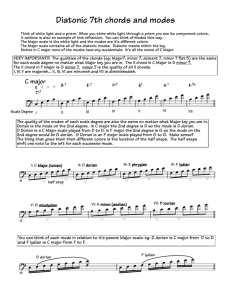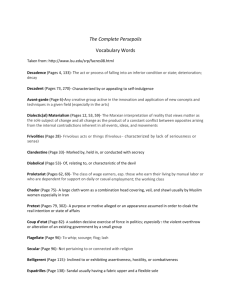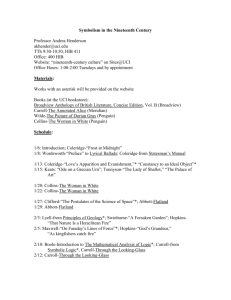The Picture Of Dorian Gray
advertisement
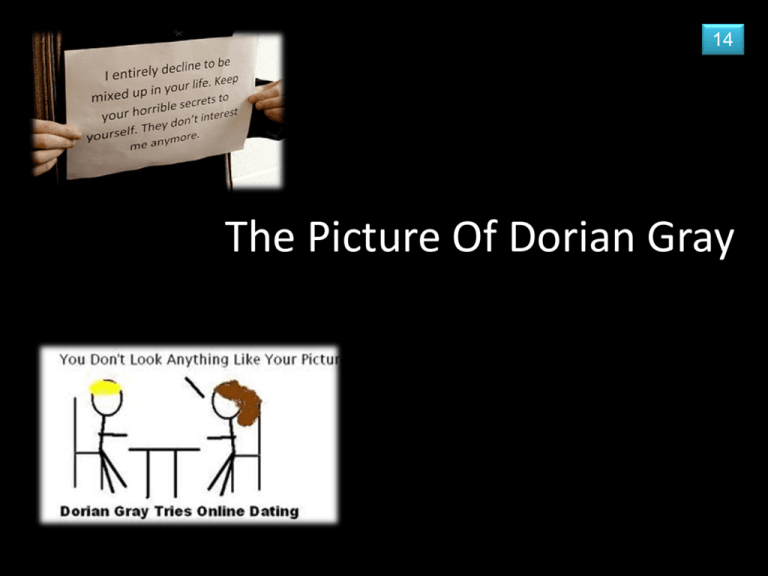
14 The Picture Of Dorian Gray 14 Chapter 14 - Quiz • At what time does Dorian’s servant wake Dorian up the morning following Basil’s murder? • Youth smiles without ____ _______. • How many years before were Alan Campbell and Dorian ‘great friends’? • At what university did Alan study? • What first brought Dorian and Alan together? • For how many months did their ‘intimacy’ last? • How many hours did Campbell say that his ‘experiment’ would last for? • After murdering Basil, in what way has the portrait changed? Chapter 14 – Quiz Answers • • • • • At 9 o’clock the next morning’ p.155 Youth smiles without any reason. P.155 They had been great friends once, five years before. P.158 Cambridge p.158 In fact, it was music that had first brought him and Dorian Gray together p.158 • For eighteen months their intimacy lasted p.159 • It will take about five hours p.165 • Loathsome red dew that gleamed, wet and glistening, on one of the hands, as though the canvas had sweated blood? P.165 14 14 Chapter Summary • Dorian begins his day at leisure and sends the servant with a note for Alan Campbell • When he begins to feel troubled, he reads the poetry of Gautier • Alan Campbell arrives and Dorian asks him to dispose of the body. He is reluctant, but Dorian shows him a letter which he will send if Alan refuses to help him. • Many hours later the body of Basil is gone. Analysis • ‘…As he opened his eyes a faint smile passed across his lips, as though he had been lost in some delightful dream. Yet he had not dreamed at all. His night had been untroubled by any images of pleasure or pain’ • Wilde is playing with conventions. Use of pathetic fallacy – ‘there was a genial warmth in the air. It was almost like a morning in may’ – laughter and play. Spring • Gradually the events of the preceding night crept with silent blood- stained feet onto his brain and reconstructed themselves there with terrible distinctness. The events are personified – so that Dorian doesn’t have to take the blame. • ‘He winced at the memory of all that he had suffered’ • ‘The dead man was still sitting there, too’ • Notice how he is no longer Basil. In the same way when Sibyl died she became ‘the girl’ p.101 – Dehumanizes. P.156, 157 • ‘He spent a long time also over breakfast, tasting the various dishes…’ • ‘As soon as he was alone, he lit a cigarette, and began sketching upon a piece of paper, drawing first flowers, and bits of architecture and then human faces’ • ‘As he turned over the pages his eye fell on the poem…’ • ‘Suddenly he remarked that every face that he drew seemed to have a fantastic likeness to Basil Hawllward’1. • This line which effectively indicates the onset of Dorian’s psycho-logical decline, had earlier been used by Wilde in his study of the poisoner Wainewright, ‘Pen, Pencil and Poison’. 14 Sur un gamme chromatique, On (a background of) a chromatic range, Émaux et Camées Le sein de perles ruisselant, Pearls* flowing along her breasts, La Venus de l'Adriatique The Adriatic’s Venus soar Sort de l’eau son corps rose et blanc. Emerge (from the water) her rosy and white body Devant une façade rose, In front of a rosy facade*, Sur le marbre d'un escalier. On the marble* of stairs Les dômes, sur l'azur des ondes, The domes*, on the azur water, Suivant la phrase au pur contour, Because of the contour’s purety of the phrase*, S'enflent comme des gorges* rondes Are swelling so as the plumpness of breasts Que soulève un soupir d'amour. rise up for a love sigh. L'esquif aborde et me dépose, The boat accost and land me, Jetant son amarre au pilier, After having thrown its hawser at the pillar, Chromatic range : range of different colours Pearls : drops of water Adriac's Venus : the lacustrine city Venice Domes : round and bulging church's roof Phrase : reference to the circular base of the domes (?) Facade : vertical front part of a building Gorge : (old and sophisticate way to use "throat" instead of "breasts". Actually in use in the word "soutien-gorge" (bra). On the marble : the stairs are made of marble, but French language sometimes use to consider the material rather than the object. Literary Illusion • Wilde uses literary illusion to illustrate the Damage to Dorian’s psych (human soul, mind or spirit) • As Dorian tries to distract himself with poetry, the images reflect his inner landscape. First comes a snatch of poetry about the hand of a murderer and Dorian gazes at his own hands. In psychology, desensitization (also called inurement) is defined as the diminished emotional responsiveness to a negative or aversive stimulus after repeated exposure to it ‘all I ask of you is to perform a certain scientific experiment’ p162 ‘the horrors that you do there don’t affect you’ Irony • ‘Your friend Lord Henry Wotton can’t have taught you much about psychology’ • Dorian has learned from Lord Henry the technique of hypnotic speech. He plies Alan with false logic: Alan is a scientist and scientists handle dead bodies; therefore this would be no different from an experiment. • Dorian also hints that Alan’s treatment of dead bodies makes him as callous as Dorian is himself. This prepares the ground for a final master-stroke. The victim is convinced the whole situation is his fault. Dorian’s accusation: ‘you treated me as no man has ever dared to treat me’ and the frightening addition ‘no living man at least’ suggest that he now thinks of Blackmail as a relatively lenient punishment for a man who has crossed him 14 Dorian’s letter to Alan HE WROTE ONE TO SIBYL TOO. ‘The assumption is that Dorian is privy to some secret in Campbell's past. The two most likely possibilities seem to be (1) a homosexual encounter, or (2) drug use. The first is supported by Wilde's own homosexual proclivities, while the second seems to be indicated by Dorian's own later movements in a London opium den.’ 14 Analysis • Same kind of symmetry used as in Chapter 2 and 4: Dorian is posed to echo and contrast with a previous image of him. Here he lies peacefully asleep. (Notice chapter 8 opens in the same way, after the betrayal of Sibyl) • Chapter VIII (8) ‘It was long past noon when he awoke’ p.91 • Chapter XIV (14) ‘At nine o’clock the next morning… Dorian was sleeping quite peacefully…. He looked like a boy who had been tired out with play, or study’ • Words like musical or artistic were often used in the 19th century as a way of implying that a man was homosexual , and the references to the shared interest in music are in part a way of coding the relationship between Dorian and Alan as homosexual . They also of course symbolize harmony and happiness, and Alan’s abandonment of music is a sign that he is not at peace with himself. Blackmail • Blackmail – over sexual or financial misconduct – was a common theme in Victorian literature and features in Wilde’s play ‘An Ideal Husband’ • Rapidly, the Labouchere Amendment became known as ‘the blackmailer’s charter’. The practiced way in which Dorian produces a letter written in advance in order to force AC to get rid of Basil’s body suggests that he is all too familiar with the mechanics of this process • ‘It is a matter of life and death, Alan, and to more than one person. Sit down’ -> threat? p160 The perfect Blackmailer • A blackmailer exploiting a past relationship may try to move his victim emotionally. Dorian shows an assured technique here, making fleeting allusions to his own pain: ‘You don’t know what he had made me suffer’, ‘I almost fainted with Terror (foreshadows when he actually does faint with Terror – seeing James Vane). • By not dwelling on it, he gives Alan a chance to reflect on any feelings that he may still have for Dorian. • He is willing to grovel, using words such as ‘beg’ but he also lets Alan know that he is capable of murder. POEM What the shallows told = DORIAN’S TASTE FOR OPIUM 14 • ‘He grew nervous and a horrible fit of terror came over him’P.158 • ‘he… began to pace up and down the room, looking like a beautiful caged thing’ • ‘then suddenly time stopped for him’ p.159 • Frightening images in poem – predatory crocodiles and vultures – hint at visions of a kind to suggest that Dorian has a taste for opium. As time itself seems to slow down we would be reading an account of the drug’s affects. Dorian’s Response – about the guy he murdered. • ‘Poor Basil,! What a horrible way for a man to die’ http://www.gradesaver.com/thepicture-of-dorian-gray/studyguide/section10/ Chapter 14 Summary 14 14 Characters 14 Characters • Alan Campbell and Sibyl Vane Similarities: • Both brilliantly talented and finally destroyed • Chooses his laboratory as the setting for his own death. • Both Commit suicide. • Dorian writes them both letters after his bad actions. • Dorian sleeps well – in chapter 8 and 14, the morning after Sibyl’s suicide and Basil’s murder. HANDS • P132 (yn)THE POWER WAS IN THE HANDS OF DORIAN • Page 159. His hands were curiously cold (dor) • P.160 ‘He kept his hands in the pockets of his Astrakhan coat, and seemed not to have noticed the gesture with which he had been greeted’. Campbell doesn’t shake Dorian’s hand but once the blackmailing letter is produced – Dorian can touch him and know that he will not be shaken off. • Loathsome red dew that gleamed, wet and glistening, on one of the hands, as though the canvas had sweated blood? P.165 • ‘First comes a snatch of poetry about the hand of a murderer’ Dorian looks at his own hands Ticking Clock Motif – the clock seems to enter the minds of both Alan and Dorian, ‘dividing Time into separate atoms of agony’ 14 Key Cards/Revision • character • How we can relate it to A01 AO2 AO3 AO4 • Alan Campbell’s relationship with Dorian before hand (Page 158) 14 • • • • • • • • • • • • • • • • • How far do you agree that Dorian is to blame for his own actions? In the novel the consequences of innocence are no worse than the consequences of sin. Discuss From what narrative perspective is the novel narrated and is it appropriate? What conclusions does the novel make about the importance of love? What is the difference between the morality of the story and issues of morality expressed by the characters? What value does the narrative place on youth and beauty? How important are conversations in the narrative progress of the novel? Discuss the role of influence and responsibility with respect to Dorian’s actions. What makes Wilde’s narrative style distinctive? How does the novel address the prospect of redemption? How far do you agree that Lord Henry is the devil who convinces Dorian to sell his soul? How far does the difference between the way Dorian looks and the things he does suggest duplicity is a key theme? What role does Sybil Vane play in Dorian’s story? Is she of central significance or merely a plot device? How does Wilde create distinctive voices for his characters? How important is the supernatural element of the novel? To what extent do you consider the ending of the novel to be inevitable?
